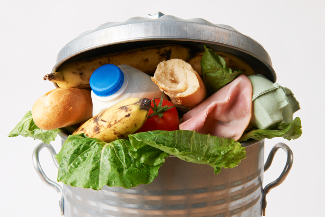Member State Page : Slovenia
Last updated on the 29/09/2023

Per capita: 68 kg in 2020
In total: 143 570 tonnes in 2020
In total: 143 254 tonnes in 2021

Primary production: 93 tonnes in 2020
Processing and manufacturing: 10 757 tonnes in 2020
Retail and other distribution of food: 15 290 tonnes in 2020
Restaurants and food services: 42 666 tonnes in 2020
Households: 74 764 tonnes in 2020

Currently not set
Contact point
- Ministry of Agriculture, Forestry and Food, email
- Ministry of the Environment and Spatial Planning, email
- Statistical Office of the Republic of Slovenia, email
Target
Targets are mentioned (but not set) in the forthcoming national waste prevention programme.
Measure
The Statistical Office of the Republic of Slovenia (SORS) collects data on food waste according to specific stages of the food supply chain: food production (including primary production); food distribution and trade; catering and food services; and households.
As part of its work on food waste, the EU-funded LIFE IP Care4Climate project aims to establish baseline data for food waste at each stage of the food supply chain and to offer insights on household food waste levels in 2021 (e.g. edible vs. inedible food waste). The methodology that will be followed to measure food waste levels in Slovenian households is a combination of compositional analysis of bio-waste and the diary method.
Act
In Slovenia, measures to reduce food losses and waste are included in the strategy for less food losses and waste for the entire food supply chain, developed by the Ministry of Agriculture, Forestry and Food (not yet adopted). The strategy will be accompanied by an action plan that lays down the goals, timetables and responsible authorities; and it includes the following activities:
- improving the efficiency of sustainable production and processing, more efficient distribution, marketing and sales;
- information, awareness raising and cooperation;
- education and training;
- stakeholder cooperation; and
- legislative measures.
On the occasion of the International Day of Awareness of Food Loss and Waste 2020, the Slovenian Ministry of Agriculture, Forestry and Food, together with other stakeholders of the agri-food chain, signed a Statement of Intent to enhance cooperation in reducing food losses and waste in the food supply chain. Stakeholders expressed their common interest in and support of the goals of the Slovenian national strategy for less food losses and food waste and their commitment to a respectful, responsible and sustainable from-farm-to-fork approach to food.
The Ministry of the Environment and Spatial Planning is currently developing a food waste prevention programme as part of the national waste prevention programme. Food loss and waste prevention measures are included in various strategic documents, such as the resolution ‘Our food, countryside and natural resources post-2021’, the national strategic plan for aquaculture development 2021-2027, the operational program for the implementation of the European Maritime Fisheries and Aquaculture Fund (EMFAF) in the Republic of Slovenia for the period 2021-2027, the resolution on the national program on nutrition and physical activity for health 2015–2025. Measures to reduce food losses in primary production are also included in the national common agricultural policy strategic plan.
The operational program of measures for reducing greenhouse gas (GHG) emissions by 2020 identifies food waste among the important action areas, drawing a link between food waste prevention and climate change mitigation efforts. The aim of the program is to ensure that GHG emissions from waste management are reduced by 44% by 2020 compared to 2005 and by 57% by 2030, for example by redirecting biodegradable waste from landfill to aerobic and anaerobic treatment.
A working group for food donation, established in 2013, aims to solve the issues that humanitarian organizations face when redistributing food. The Agriculture Act defines the possibility to co-finance the purchase of technical equipment for humanitarian organizations that distribute donated food, together with the Ministry of Agriculture, Forestry and Food. Within the framework of tax legislation (Act on rules on the implementation of the Value Added Tax), the own price or purchase price of donated food is equal to 0 if the total value of donated goods does not exceed 2% of the donor’s revenue.
The Ministry of the Environment and Spatial Planning and the Ministry of Agriculture, Forestry and Food finance measures to valorise food resources and to create new market opportunities for them.
Governmental authorities collaborate with representatives from all stages of the supply chain in order to raise awareness about the issue of food waste. The Our Super Food (Naša super hrana) website and its related social media accounts deliver relevant information for consumers, including on the different types of date marking. The Food Safety, Veterinary and Plant Protection Administration also published explanations on shelf life and date marking on their dedicated webpage. In April 2021, the first Slovenian Day Without Food Waste took place with various activities such as a short story competition, educational activities at schools and live cooking shows.
Through the EAT Circular project, sponsored by the European Institute of Innovation and Technology - Climate Knowledge and Innovation Community (KIC), training sessions are offered for public and private officers on strategies to reduce the ‘food print’ (the amount of wasted food). Topics covered by the training session include policy, best practices, processes, business model and technologies to measure food waste/surplus, ‘divert’ it, and avoid disposal.
The topic of food waste is part of educational activities carried out in kindergartens and schools (e.g. in the context of the ‘Traditional Slovenian Breakfast’ project; the ‘School Fruit, Vegetables and Milk’ scheme, the ‘Europe in School’ competition that dedicated its 2020 edition to food waste, etc.). As part of the 6-year strategy of the school scheme (2017-2023), centres for school and extracurricular activities may carry out projects on food waste prevention.
The non-governmental organisation Ecologists Without Borders (Ekologi brez meja) carried out a project named ‘Food waste prevention in the public sector and households – Don’t throw away food!’, co-financed by the Ministry of the Environment and Spatial Planning. The main focus of the project was to prevent food waste in hospitals and in retirement homes, and its results include a toolkit for monitoring food waste, the awareness-raising campaign ‘Just eat it!’ and workshops for intergenerational integration (the elderly taught younger kids good practices with food).
The Slovenian Research Agency and the Slovenian Ministry of Agriculture, Forestry and Food funded the project ‘Food, not waste: prevention, reduction and use of waste food’ (2020-2022), which focuses on food waste sources across various stages of the food supply chain and on different management models in order to prevent and reduce food surpluses, and to revalorize food waste.
The Ministry of the Environment and Spatial Planning is the leading partner of the EU-funded project LIFE IP CARE4CLIMATE (2019-2026), partially financed through the Slovenian Climate Change Fund. The project focuses on awareness-raising activities (for good food management at home, smart shopping etc.), sharing best practices, education and capacity building on climate change related topics, among which food waste prevention and reduction. The project is developing a set of measures to prevent and reduce food waste at all stages of the food supply chain, focussing on households, the hospitality and food services sector, retail and other distribution of food, processing and manufacturing.
